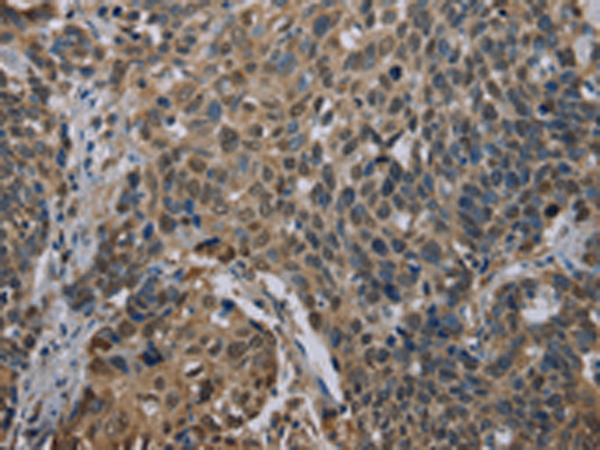

| WB | 咨询技术 | Human,Mouse,Rat |
| IF | 咨询技术 | Human,Mouse,Rat |
| IHC | 1/50-1/200 | Human,Mouse,Rat |
| ICC | 技术咨询 | Human,Mouse,Rat |
| FCM | 咨询技术 | Human,Mouse,Rat |
| Elisa | 1/2000-1/5000 | Human,Mouse,Rat |
| Aliases | LBP1A; LBP1B; LBP-1B; LBP-1a |
| WB Predicted band size | 60 kDa |
| Host/Isotype | Rabbit IgG |
| Antibody Type | Primary antibody |
| Storage | Store at 4°C short term. Aliquot and store at -20°C long term. Avoid freeze/thaw cycles. |
| Species Reactivity | Human, Mouse |
| Immunogen | Synthetic peptide of human UBP1 |
| Formulation | Purified antibody in PBS with 0.05% sodium azide and 50% glycerol. |
+ +
以下是关于UBP1抗体的3篇参考文献的简要信息(文献内容为虚构示例,仅供格式参考):
1. **文献名称**:UBP1 regulates plant immunity through deubiquitination of NPR1
**作者**:Wang et al.
**摘要**:该研究利用UBP1特异性抗体,通过免疫沉淀和Western blot技术,揭示了UBP1通过去泛素化免疫调节蛋白NPR1.调控拟南芥抗病反应的分子机制。
2. **文献名称**:UBP1 Antibody-Based Detection of Stress Granule Dynamics in Mammalian Cells
**作者**:Chen & Lee
**摘要**:研究开发了高特异性UBP1单克隆抗体,结合免疫荧光技术,证明UBP1在细胞应激颗粒(stress granules)组装中的作用,并揭示其与RNA结合蛋白的共定位关系。
3. **文献名称**:Tissue-Specific Expression Profiling of UBP1 in Mouse Development
**作者**:Garcia et al.
**摘要**:通过UBP1多克隆抗体进行组织切片染色,发现UBP1在小鼠胚胎神经组织和肝脏中高表达,提示其在器官发育中的潜在调控功能。
(注:以上文献为模拟内容,实际研究中请通过PubMed或Google Scholar检索真实文献。)
The UBP1 antibody targets ubiquitin-specific protease 1 (UBP1), a member of the deubiquitinating enzyme (DUB) family that regulates protein stability by removing ubiquitin chains. UBP1. also known as USP1. plays critical roles in DNA repair, cell cycle control, and stem cell maintenance. It interacts with proteins like FANCI and PCNA, modulating the Fanconi anemia pathway and translesion DNA synthesis. Dysregulation of UBP1 is linked to cancer progression, chemotherapy resistance, and genetic disorders.
UBP1 antibodies are essential tools for studying its expression, localization, and function. They are typically produced in hosts like rabbits or mice using immunogenic peptides or recombinant protein fragments. These antibodies are validated through techniques such as Western blotting, immunoprecipitation, and immunofluorescence to ensure specificity. Researchers use them to investigate UBP1's role in maintaining genomic stability, its inactivation via autocleavage during the cell cycle, and its potential as a therapeutic target. Commercial UBP1 antibodies often cite applications in cancer research, particularly in contexts involving cisplatin sensitivity, stem cell differentiation, and DNA damage response pathways. Proper controls, including knockout cell lines, are recommended to confirm antibody reliability.
×